Advanced glycation end products stimulate osteoblast apoptosis via the MAP kinase and cytosolic apoptotic pathways
- PMID: 17064973
- PMCID: PMC1913208
- DOI: 10.1016/j.bone.2006.09.011
Advanced glycation end products stimulate osteoblast apoptosis via the MAP kinase and cytosolic apoptotic pathways
Abstract
We have previously shown that diabetes significantly enhances apoptosis of osteoblastic cells in vivo and that the enhanced apoptosis contributes to diabetes impaired new bone formation. A potential mechanism is enhanced apoptosis stimulated by advanced glycation end products (AGEs). To investigate this further, an advanced glycation product, carboxymethyl lysine modified collagen (CML-collagen), was injected in vivo and stimulated a 5-fold increase in calvarial periosteal cell apoptosis compared to unmodified collagen. It also induced apoptosis in primary cultures of human or neonatal rat osteoblastic cells or MC3T3-E1 cells in vitro. Moreover, the apoptotic effect was largely mediated through RAGE receptor. CML-collagen increased p38 and JNK activity 3.2- and 4.4-fold, respectively. Inhibition of p38 and JNK reduced CML-collagen stimulated apoptosis by 45% and 59% and by 90% when used together (P<0.05). The predominant apoptotic pathway induced by CML-collagen involved caspase-8 activation of caspase-3 and was independent of NF-kappaB activation. When osteoblastic cells were exposed to a long-term low dose incubation with CML-collagen, there was a higher degree of apoptosis compared to short-term incubation. In more differentiated osteoblastic cultures, apoptosis was enhanced even further. These results indicate that advanced glycation end products, which accumulate in diabetic and aged individuals, may promote apoptosis of osteoblastic cells and contribute to deficient bone formation.
Figures
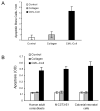
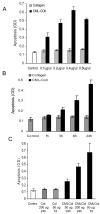

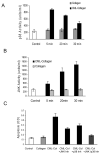
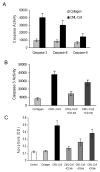
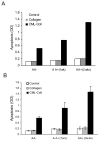
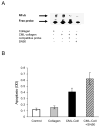
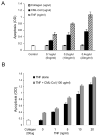
References
-
- Akin O, Gol K, Akturk M, Erkaya S. Evaluation of bone turnover in postmenopausal patients with type 2 diabetes mellitus using biochemical markers and bone mineral density measurements. Gynecol Endocrinol. 2003;17:19–29. - PubMed
-
- Alikhani M, Alikhani Z, Graves D. FOXO1 functions as a master switch that regulates gene expression necessary for TNF-induced fibroblast apoptosis. J Biol Chem. 2005;280:12096–102. - PubMed
-
- Alikhani M, Alikhani Z, Raptis M, Graves D. TNF-alpha in vivo stimulates apoptosis in fibroblasts through caspase-8 activation and modulates the expression of pro-apoptotic genes. J Cell Physiol. 2005;201:341–8. - PubMed
-
- Alikhani Z, Alikhani M, Boyd C, Nagao K, Trackman P, Graves D. Advanced glycation endproducts enhance expression of pro-apoptotic genes and stimulate fibroblast apoptosis through cytoplasmic and mitochondrial pathways. J Biol Chem. 2005;280:12087–95. - PubMed
-
- Al-Mashat HA, Kandru S, Liu R, Behl Y, Desta T, Graves DT. Diabetes enhances mRNA levels of proapoptotic genes and caspase activity, which contribute to impaired healing. Diabetes. 2006;55:487–95. - PubMed
Publication types
MeSH terms
Substances
Grants and funding
LinkOut - more resources
Full Text Sources
Research Materials

